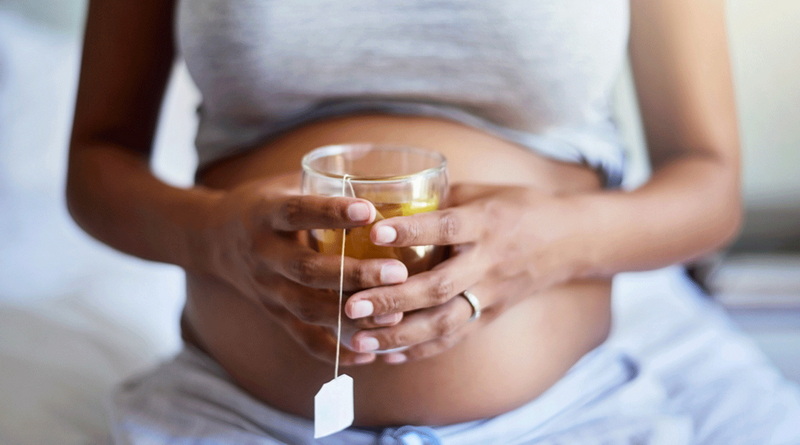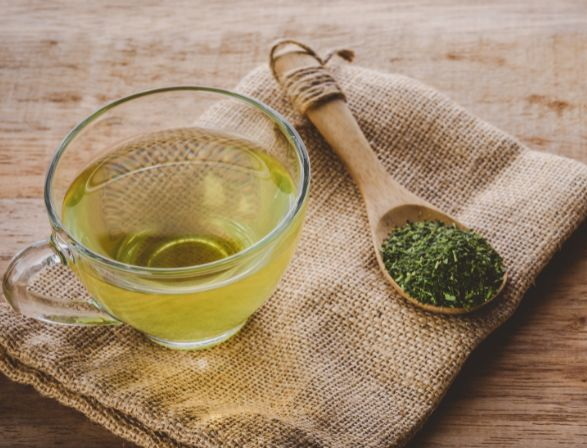Content Menu
● What is Green Tea Extract?
● Benefits of Green Tea Extract
>> 1. Antioxidant Properties
>> 2. Blood Sugar Regulation
>> 3. Mood Enhancement
>> 4. Immune Support
● Risks Associated with Green Tea Extract During Pregnancy
>> 1. Caffeine Content
>> 2. Folic Acid Absorption
>> 3. Potential Toxicity at High Doses
● Recommendations for Consumption
● Effects on Maternal Health
● Effects on Fetal Development
● Conclusion
● FAQ
>> 1. Is it safe to drink green tea during early pregnancy?
>> 2. Can drinking green tea lead to miscarriage?
>> 3. What are the effects of too much caffeine on fetal development?
>> 4. How does green tea affect folic acid absorption?
>> 5. Should I take a prenatal vitamin if I drink green tea?
● Citations:
Pregnancy is a time of significant change for women, and with these changes often come questions about diet and lifestyle choices. One common query among expectant mothers is whether it is safe to consume green tea extract during pregnancy. This article will delve into the potential benefits and risks associated with green tea extract consumption while pregnant, providing a comprehensive overview to help guide informed decisions.

What is Green Tea Extract?
Green tea extract (GTE) is derived from the leaves of the *Camellia sinensis* plant and is rich in antioxidants, particularly catechins like epigallocatechin gallate (EGCG). These compounds are renowned for their health benefits, including anti-inflammatory and antioxidant properties. GTE is often consumed in supplement form or as part of various health products due to its perceived health benefits.
Benefits of Green Tea Extract
1. Antioxidant Properties
Green tea extract is packed with antioxidants that can help combat oxidative stress in the body. This is particularly beneficial during pregnancy, as oxidative stress can affect both maternal health and fetal development.
2. Blood Sugar Regulation
Some studies suggest that green tea extract may help regulate blood sugar levels, which can be beneficial for pregnant women, especially those at risk for gestational diabetes. Maintaining stable blood sugar levels is crucial for both maternal health and fetal development.
3. Mood Enhancement
The presence of L-theanine in green tea can promote relaxation without drowsiness, potentially alleviating mood swings commonly experienced during pregnancy. This can be particularly helpful as hormonal changes can lead to increased anxiety and stress.
4. Immune Support
Green tea extract can enhance immune function, which is crucial during pregnancy as the body undergoes various immune adaptations. A stronger immune system can help protect both the mother and the developing fetus from infections.
Risks Associated with Green Tea Extract During Pregnancy
While there are potential benefits, there are also significant risks to consider when consuming green tea extract during pregnancy.
1. Caffeine Content
Green tea contains caffeine, which can cross the placenta and affect fetal development. High caffeine intake during pregnancy has been linked to low birth weight, preterm labor, and developmental issues. The American College of Obstetricians and Gynecologists recommends limiting caffeine intake to less than 200 mg per day during pregnancy.
- An 8-ounce cup of green tea typically contains about 29-49 mg of caffeine, depending on the type and brewing method[4][8].
2. Folic Acid Absorption
Catechins found in green tea can inhibit the absorption of folic acid, a critical nutrient for fetal development that helps prevent neural tube defects (NTDs). Research indicates that excessive consumption of green tea (more than three cups per day) may lead to lower serum folate levels in pregnant women[1][7]. This reduction in folate availability can increase the risk of NTDs in the developing fetus.
3. Potential Toxicity at High Doses
Research indicates that high doses of green tea extract may lead to adverse effects such as liver toxicity and developmental issues in animal studies[6]. The exact impact on human pregnancies remains less clear but suggests caution.
Recommendations for Consumption
Given the potential risks associated with green tea extract during pregnancy, moderation is key. Here are some recommendations:
- Limit Intake: It's generally advised to limit green tea extract consumption to one or two cups per day, ensuring that total caffeine intake remains below 200 mg.
- Consult Healthcare Providers: Pregnant women should discuss any supplement use with their healthcare provider to ensure safety and appropriateness based on individual health circumstances.
- Opt for Decaffeinated Options: If consuming green tea for its benefits, consider opting for decaffeinated versions to minimize caffeine intake while still enjoying some antioxidant benefits.

Effects on Maternal Health
Research has shown that moderate consumption of green tea extract may have various effects on maternal health:
- Weight Management: Some studies suggest that green tea may help manage weight gain during pregnancy due to its metabolism-boosting properties[9]. However, excessive consumption could lead to adverse effects on weight management.
- Inflammation Reduction: Green tea's anti-inflammatory properties may help reduce inflammation in pregnant women, potentially leading to better overall health outcomes[3].
Effects on Fetal Development
The impact of maternal consumption of green tea extract on fetal development has been a subject of research:
- Developmental Outcomes: Animal studies have indicated that high doses of green tea extract may affect fetal growth and development negatively[6]. While this research is not directly applicable to humans, it highlights the need for caution regarding dosage.
- Long-term Effects: Some studies suggest that prenatal exposure to high levels of catechins may alter metabolic programming in offspring, potentially leading to obesity or metabolic disorders later in life[9][10].
Conclusion
In conclusion, while green tea extract offers several potential health benefits due to its antioxidant properties and ability to support blood sugar regulation, it also poses risks that should not be overlooked during pregnancy. The caffeine content and its effect on folic acid absorption make it essential for expectant mothers to approach green tea extract consumption with caution. Moderation and consultation with healthcare professionals are crucial steps in making informed dietary choices during this critical time.

FAQ
1. Is it safe to drink green tea during early pregnancy?
Yes, moderate consumption (1-2 cups per day) is generally considered safe; however, excessive intake should be avoided due to potential risks associated with caffeine and folic acid absorption.
2. Can drinking green tea lead to miscarriage?
Excessive caffeine intake has been linked to an increased risk of miscarriage; therefore, it's essential to limit consumption during pregnancy.
3. What are the effects of too much caffeine on fetal development?
High caffeine intake can lead to low birth weight, preterm labor, and developmental delays in infants.
4. How does green tea affect folic acid absorption?
Catechins in green tea can inhibit folic acid absorption in the intestines, which may increase the risk of neural tube defects if consumed excessively during early pregnancy.
5. Should I take a prenatal vitamin if I drink green tea?
Yes, taking a prenatal vitamin that includes folate can help mitigate the risk of folic acid deficiency while consuming green tea.
Citations:
[1] https://mothertobaby.org/baby-blog/should-pregnant-women-get-the-green-light-to-drink-green-tea/
[2] https://www.webmd.com/vitamins/ai/ingredientmono-960/green-tea
[3] https://pmc.ncbi.nlm.nih.gov/articles/PMC5790015/
[4] https://www.healthline.com/nutrition/is-tea-safe-during-pregnancy
[5] https://www.marchofdimes.org/find-support/topics/pregnancy/caffeine-pregnancy
[6] https://pmc.ncbi.nlm.nih.gov/articles/PMC8324952/
[7] https://www.lamaze.org/Giving-Birth-with-Confidence/GBWC-Post/is-green-tea-off-limits-during-pregnancy
[8] https://www.healthline.com/health/pregnancy/green-tea-while-pregnant
[9] https://journals.plos.org/plosone/article?id=10.1371%2Fjournal.pone.0199969
[10] https://pmc.ncbi.nlm.nih.gov/articles/PMC4557736/






























